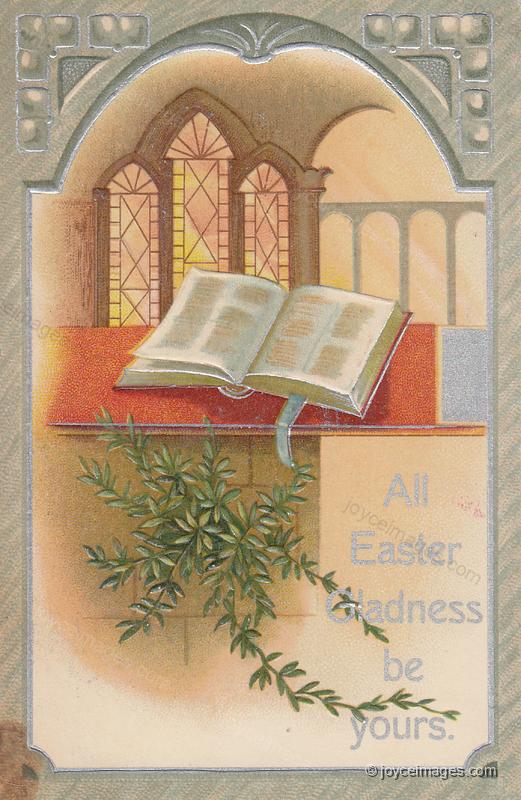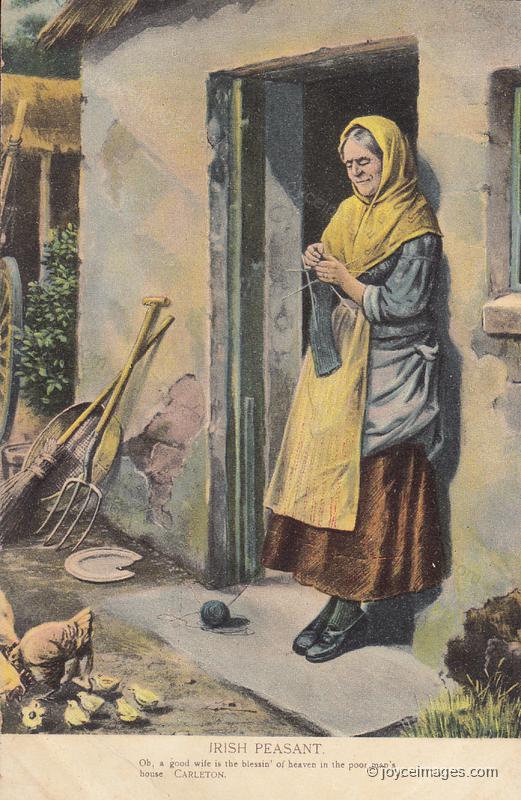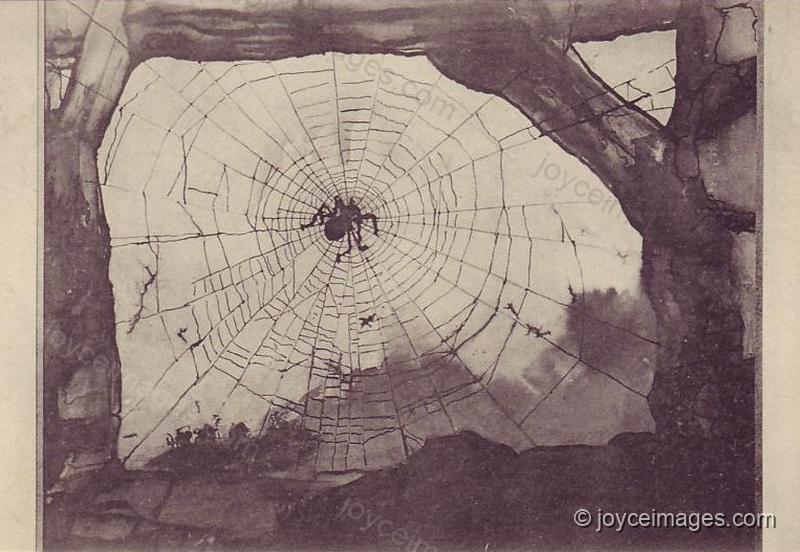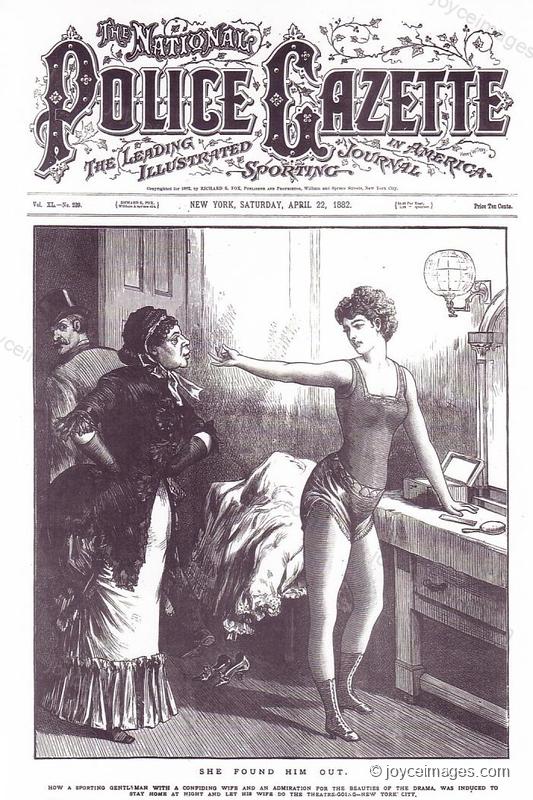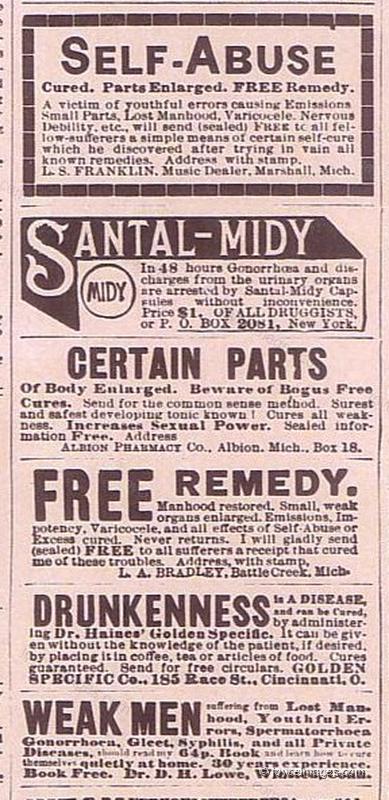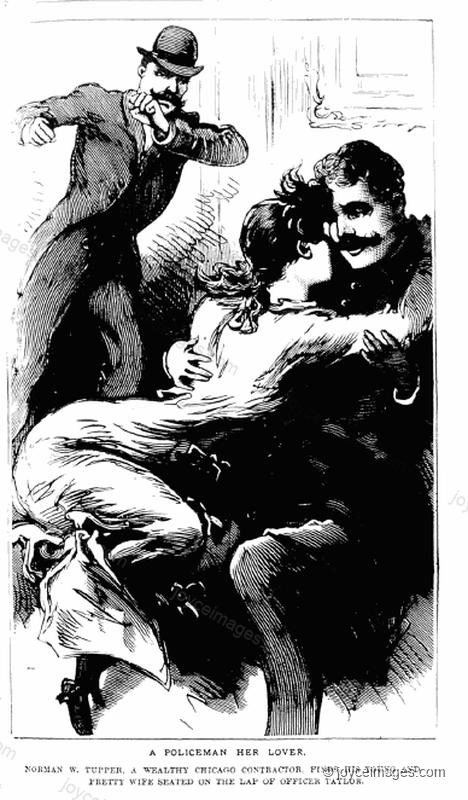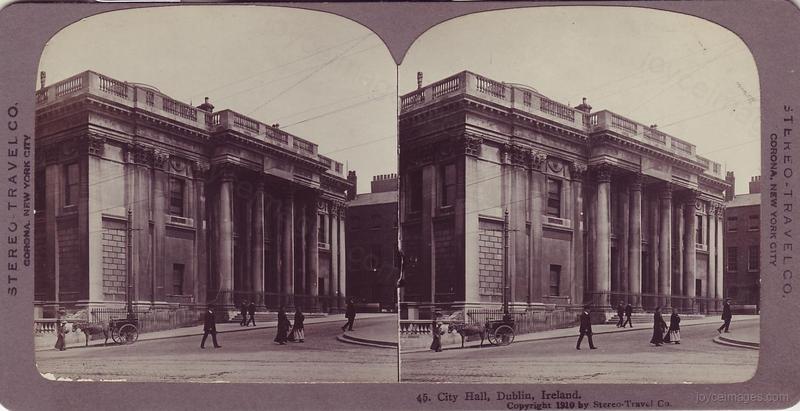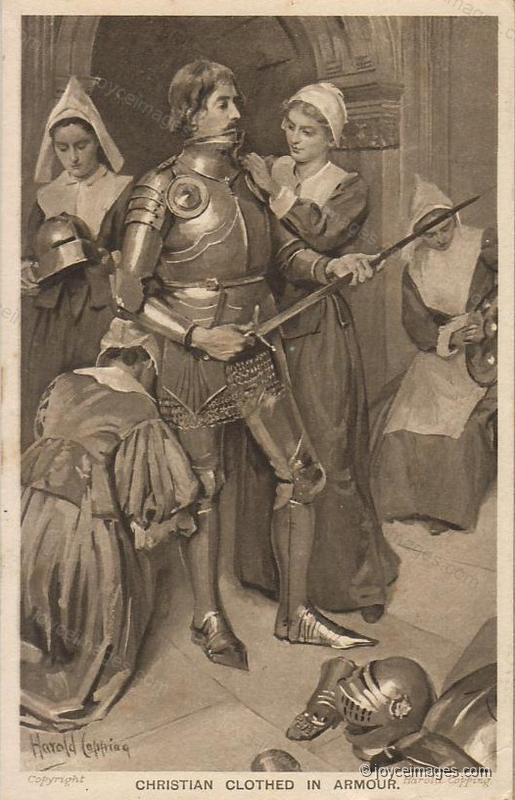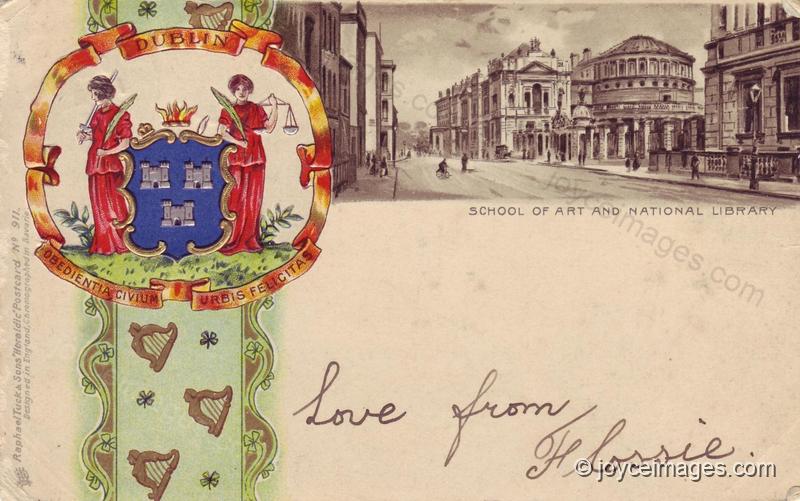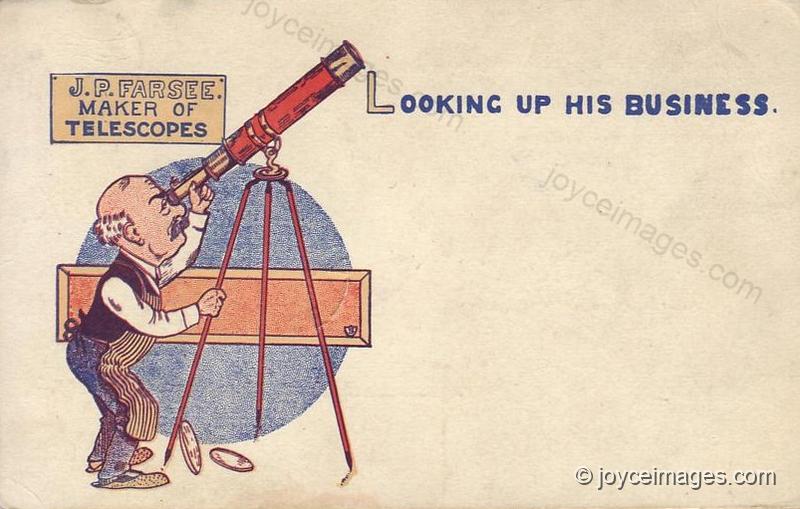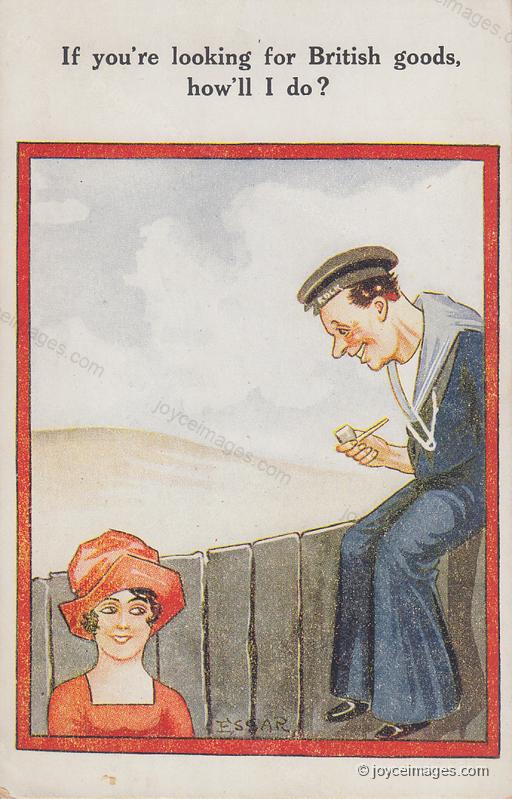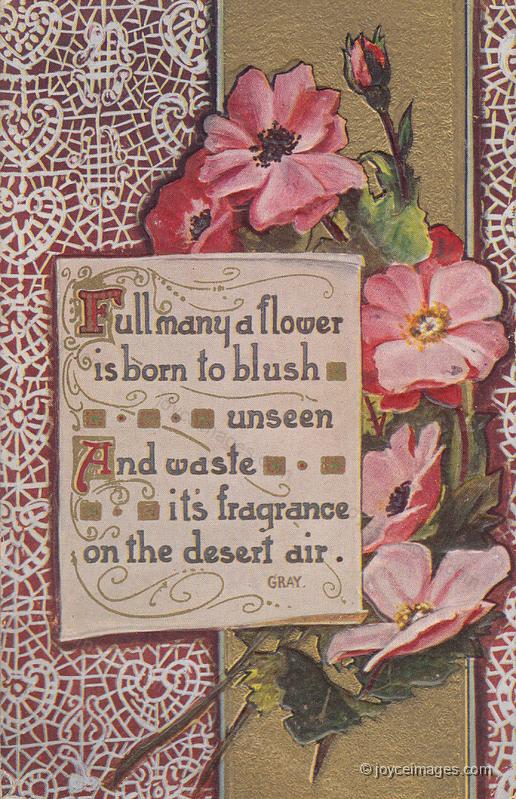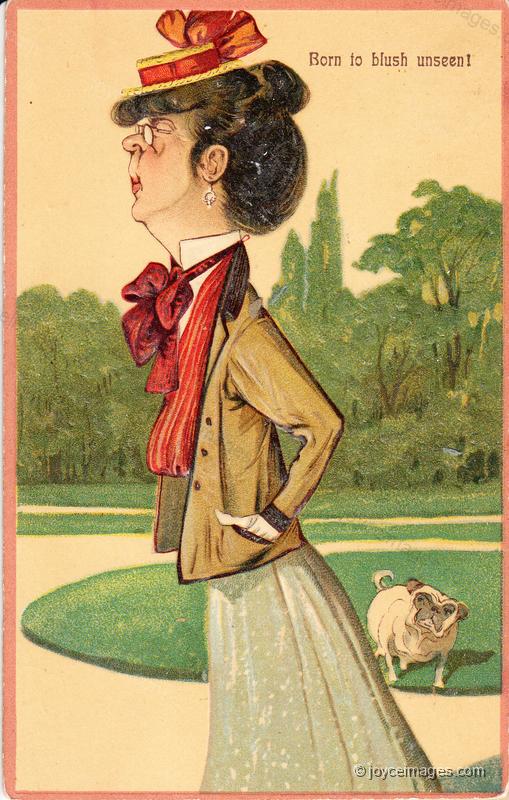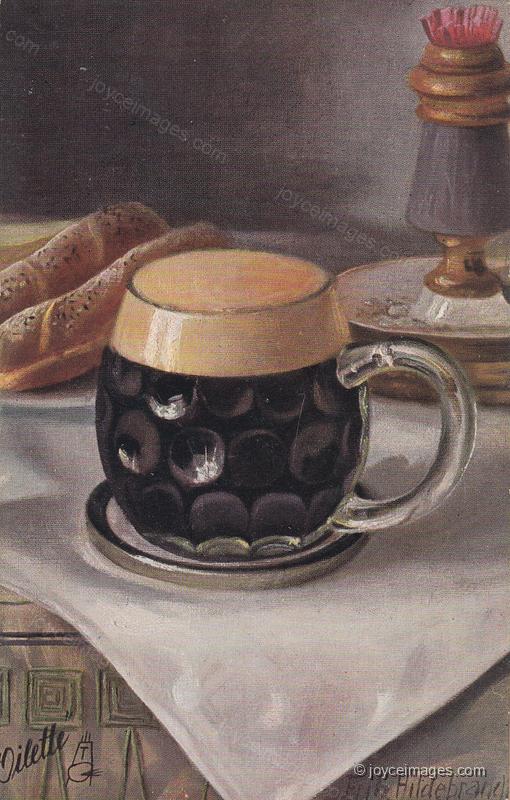"And he conjured them by Him who died on rood that they should well and truly try and true deliverance make in the issue joined between their sovereign lord the king and the prisoner at the bar and true verdict give according to the evidence so help them God" (U12.1130)
"and kiss the book. And they rose in their seats, those twelve of Iar, and they swore by the name of Him Who is from everlasting that they would do His rightwiseness. And straightway the minions of the law led forth from their donjon keep one whom the sleuthhounds of justice had apprehended in consequence of information received. And they shackled him hand and foot and would take of him ne bail ne mainprise but preferred a charge against him for he was a malefactor.
— Those are nice things, says the citizen, coming over here to Ireland filling the country with bugs.
So Bloom lets on he heard nothing and he starts talking with Joe, telling him he needn't trouble about that little matter till the first but if he would just say a word to Mr Crawford. And so Joe swore high and holy by this and by that he'd do the devil and all." (U12.1134)
— Those are nice things, says the citizen, coming over here to Ireland filling the country with bugs.
So Bloom lets on he heard nothing and he starts talking with Joe, telling him he needn't trouble about that little matter till the first but if he would just say a word to Mr Crawford. And so Joe swore high and holy by this and by that he'd do the devil and all." (U12.1134)
"— Swindling the peasants, says the citizen, and the poor of Ireland. We want no more strangers in our house.
— O, I'm sure that will be all right, Hynes, says Bloom. It's just that Keyes, you see.
— Consider that done, says Joe.
— Very kind of you, says Bloom.
— The strangers, says the citizen. Our own fault. We let them come in. We brought them in. The adulteress and her paramour brought the Saxon robbers here.
— Decree nisi, says J. J." (U12.1150)
— O, I'm sure that will be all right, Hynes, says Bloom. It's just that Keyes, you see.
— Consider that done, says Joe.
— Very kind of you, says Bloom.
— The strangers, says the citizen. Our own fault. We let them come in. We brought them in. The adulteress and her paramour brought the Saxon robbers here.
— Decree nisi, says J. J." (U12.1150)
"And Bloom letting on to be awfully deeply interested in nothing, a spider's web in the corner behind the barrel, and the citizen scowling after him and the old dog at his feet looking up to know who to bite and when." (U12.1160)
"- A dishonoured wife, says the citizen, that's what's the cause of all our misfortunes.
- And here she is, says Alf, that was giggling over the Police Gazette with Terry on the counter, in all her warpaint.
And what was it only one of the smutty yankee pictures Terry borrows off of Corny Kelleher." (U12.1163)
The Police Gazette was a weekly 'yankee' magazine, its offices in New York. As seen in this issue from 1882, the full title was 'The National Police Gazette: The Leading Illustrated Sporting Journal in America'.
The Police Gazette began publication in 1845. In 1876-77, it was taken over by Richard Kyle Fox, an Irishman from Belfast who had emigrated to America in 1874. Fox made the Police Gazette an extremely successful 'sensationalist' publication.
- And here she is, says Alf, that was giggling over the Police Gazette with Terry on the counter, in all her warpaint.
And what was it only one of the smutty yankee pictures Terry borrows off of Corny Kelleher." (U12.1163)
The Police Gazette was a weekly 'yankee' magazine, its offices in New York. As seen in this issue from 1882, the full title was 'The National Police Gazette: The Leading Illustrated Sporting Journal in America'.
The Police Gazette began publication in 1845. In 1876-77, it was taken over by Richard Kyle Fox, an Irishman from Belfast who had emigrated to America in 1874. Fox made the Police Gazette an extremely successful 'sensationalist' publication.
"Secrets for enlarging your private parts. Misconduct of society belle." (U12.1169)
Richard Fox exposed the prejudice and bigotry that were prevalent at the time, and exploited their shock values: against Blacks, Jews and Chinese, foreigners in general, clergymen, the upper class, politicians etc. The Police Gazette reported (with illustrations) on all sorts of scandals and petty crimes, as well as sports and theater.
Fox introduced many innovations in journalism: the concept of the illustrated paper, the sports page, the gossip column, and the 'centerfold' (there was a 'Favorite of the Footlights' in many issues). His contributions to sports were significant: he made boxing popular, but also respectable and legal. The Police Gazette was immensely popular.
The advertisement section offered remedies for various ailments and 'habits'. The Police Gazette also promoted various self-publications.
Fox died in 1922, a multimillionaire. By that time the tabloids had started, photography had been introduced into magazines, and the Police Gazette was in decline for many years.
Richard Fox exposed the prejudice and bigotry that were prevalent at the time, and exploited their shock values: against Blacks, Jews and Chinese, foreigners in general, clergymen, the upper class, politicians etc. The Police Gazette reported (with illustrations) on all sorts of scandals and petty crimes, as well as sports and theater.
Fox introduced many innovations in journalism: the concept of the illustrated paper, the sports page, the gossip column, and the 'centerfold' (there was a 'Favorite of the Footlights' in many issues). His contributions to sports were significant: he made boxing popular, but also respectable and legal. The Police Gazette was immensely popular.
The advertisement section offered remedies for various ailments and 'habits'. The Police Gazette also promoted various self-publications.
Fox died in 1922, a multimillionaire. By that time the tabloids had started, photography had been introduced into magazines, and the Police Gazette was in decline for many years.
"Norman W. Tupper, wealthy Chicago contractor, finds pretty but faithless wife in lap of officer Taylor. Belle in her bloomers misconducting herself, and her fancyman feeling for her tickles and Norman W. Tupper bouncing in with his peashooter just in time to be late after she doing the trick of the loop with officer Taylor." (U12.1170)
As discovered by William A. Mays (www.PoliceGazette.US), this story was in the Sept 16, 1893 issue:
'A POLICEMAN HER LOVER:
Chicago police circles have been in a ferment for the last few days over a scandal that cropped out before the trial board and which will inevitably result in the dismissal of Sergeant Al Taylor, of the Thirteenth precinct.
Norman W. Tupper is a wealthy contractor, with a sumptuous home at 1137 Jackson Boulevard. His wife and two little girls had everything they desired, but the mother's infatuation with Sergeant Taylor was the family skeleton. One day recently Mr. Tupper left the house, ostensibly for the day, but returned an hour later and going suddenly into the parlor found his wife on the lap of Taylor, her arms entwining his neck, and just about to kiss his official lips. Tupper made a wild dash for the policeman, who hastily pushed Mrs. Tupper aside and reached for his revolver. The wronged husband hesitated a moment and the sergeant made his escape.'
As discovered by William A. Mays (www.PoliceGazette.US), this story was in the Sept 16, 1893 issue:
'A POLICEMAN HER LOVER:
Chicago police circles have been in a ferment for the last few days over a scandal that cropped out before the trial board and which will inevitably result in the dismissal of Sergeant Al Taylor, of the Thirteenth precinct.
Norman W. Tupper is a wealthy contractor, with a sumptuous home at 1137 Jackson Boulevard. His wife and two little girls had everything they desired, but the mother's infatuation with Sergeant Taylor was the family skeleton. One day recently Mr. Tupper left the house, ostensibly for the day, but returned an hour later and going suddenly into the parlor found his wife on the lap of Taylor, her arms entwining his neck, and just about to kiss his official lips. Tupper made a wild dash for the policeman, who hastily pushed Mrs. Tupper aside and reached for his revolver. The wronged husband hesitated a moment and the sergeant made his escape.'
"- Well, says the citizen, what's the latest from the scene of action? What did those tinkers in the city hall at their caucus meeting decide about the Irish language?" (U12.1180)
"O'Nolan, clad in shining armour, low bending made obeisance to the puissant and high and mighty chief of all Erin and did him to wit of that which had befallen," (U12.1183)
"how that the grave elders of the most obedient city, second of the realm, had met them in the tholsel, and there, after due prayers to the gods who dwell in ether supernal, had taken solemn counsel whereby they might, if so be it might be, bring once more into honour among mortal men the winged speech of the seadivided Gael." (U12.1185)
The Coat of Arms of Dublin, first granted officially to the Dublin City Assembly in 1607, includes the ancient device of the three castles (symbol of the city since the Middle Ages) and the Dublin motto in Latin: Obedientia Civium Urbis Felicitas = The Obedience of the Citizen is the Happiness of the City.
The Coat of Arms of Dublin, first granted officially to the Dublin City Assembly in 1607, includes the ancient device of the three castles (symbol of the city since the Middle Ages) and the Dublin motto in Latin: Obedientia Civium Urbis Felicitas = The Obedience of the Citizen is the Happiness of the City.
"— It's on the march, says the citizen. To hell with the bloody brutal Sassenachs and their patois." (12.1190)
"So J. J. puts in a word, doing the toff about one story was good till you heard another and blinking facts and the Nelson policy, putting your blind eye to the telescope and drawing up a bill of attainder to impeach a nation, and Bloom trying to back him up moderation and botheration and their colonies and their civilisation." (U12.1192)
"— Their syphilisation, you mean, says the citizen. To hell with them! The curse of a goodfornothing God light sideways on the bloody thicklugged sons of whores' gets! No music and no art and no literature worthy of the name. Any civilisation they have they stole from us. Tonguetied sons of bastards' ghosts.
— The European family, says J. J
— They're not European, says the citizen. I was in Europe with Kevin Egan of Paris. You wouldn't see a trace of them or their language anywhere in Europe except in a cabinet d'aisance." (U12.1197)
— The European family, says J. J
— They're not European, says the citizen. I was in Europe with Kevin Egan of Paris. You wouldn't see a trace of them or their language anywhere in Europe except in a cabinet d'aisance." (U12.1197)
"And says John Wyse:
— Full many a flower is born to blush unseen.
And says Lenehan that knows a bit of the lingo:
— Conspuez les Anglais! Perfide Albion!" (U12.1206)
From Elegy Written in a Country Churchyard, by Thomas Gray. The lines comes as:
'Full many a gem of purest ray serene
The dark unfathom'd caves of ocean bear:
Full many a flower is born to blush unseen,
And waste its sweetness on the desert air.'
— Full many a flower is born to blush unseen.
And says Lenehan that knows a bit of the lingo:
— Conspuez les Anglais! Perfide Albion!" (U12.1206)
From Elegy Written in a Country Churchyard, by Thomas Gray. The lines comes as:
'Full many a gem of purest ray serene
The dark unfathom'd caves of ocean bear:
Full many a flower is born to blush unseen,
And waste its sweetness on the desert air.'

